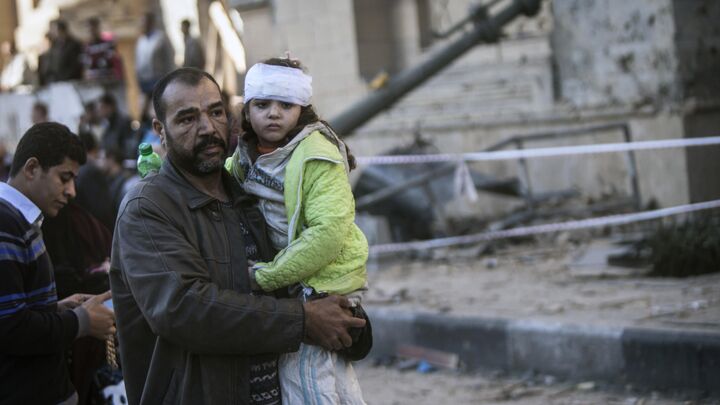
Don’t Forget, the Sinai Is Still Festering
Since the Arab Spring swept across Egypt, radical Islamists have been allowed to dramatically expand their presence in the Sinai Desert. They have gone beyond merely threatening Israel and Egypt, recently demonstrating their ability to carry out attacks with international importance. Although Syria’s jihadists have been dominating the headlines, it’s important to remember this essentially ungoverned area next to one of the world’s most important sea gates.
An Egyptian military helicopter crashed in the Sinai on January 25, killing all five crew members. A couple of days later, terrorist group Ansar Beit al-Maqdis released a video that appeared to show them shoot it down with a shoulder-launched surface-to-air missile.
Ansar Beit al-Maqdis (abm), a group praised by al Qaeda, has grown into one of the world’s most active terrorist groups over the last three years. Its name means “Supporters of Jerusalem.” The group may also be linked to some of the individuals behind the attack on America’s ambassador in Benghazi.
While Egypt has not said the helicopter was shot down, abm is probably capable of having carried out the attack. Stratfor recently reported, “The group also appears to be getting weaponry from Libya, including surface-to-air missiles” (January 30).
If abm’s claim is accurate, it is the first time a surface-to-air-missile has been used in the Sinai, which, as Time magazine points out, raises a troubling question: If abm can shoot down a helicopter, could it shoot down one of the many aircraft that take off and land in Eilat—Israel’s nearby city on the shores of the Red Sea?
It’s something Israel is concerned about; even now it is planning to build a new airport farther from the Sinai. That in itself is an admission of defeat; there’s little it can do to stop the growth of terrorists in the desert. However, that airport may not be built in time.
abm’s capabilities are also expanding in other areas. On January 24, four vehicle-borne explosive devices detonated outside the Cairo Security Directorate just after a Police Day celebration. A few days later, Egyptian Gen. Mohammed Said, who works in the interior ministry, was assassinated. abm claimed responsibility for both, while also attacking the Egyptian military and pipelines within the Sinai and launching a rocket at Israel.
“Past jihadist groups operating in the Sinai have shown the capability to strike soft tourist targets on the peninsula, bomb pipelines, attack some military and police targets and launch occasional rocket attacks against Israel,” wrote Stratfor’s Vice President of Analysis Scott Steward last week. “Ansar Beit al-Maqdis has been able to accomplish all of these, but their reach has gone far beyond the Sinai, and their ability to assassinate government officials and deliver vehicle bombs to downtown Cairo is far beyond anything we have seen with past jihadist organizations operating from the Sinai Peninsula.” He noted that these abilities “hint at outside assistance.”
Even after the military took over Egypt from the Muslim Brotherhood, it has been unable to clamp down on the Sinai—leaving jihadist groups to prosper. In recent days, it’s launched a few raids, killing some gunmen, but this is far from the systematic military takeover that is needed to secure the Sinai. Even if this did happen, it would mean Israel would have to tolerate a strong Egyptian military in an area that is meant to be a demilitarized buffer zone.
Meanwhile, the abm is a highly skilled and “professional” terrorist group, operating with relative freedom and a supply of powerful weapons from Libya. It has the potential to be a major threat. Steward concludes his article by noting:
However, if a professional al Qaeda franchise like Ansar Beit al-Maqdis entrenches itself in Egypt, it could foment a protracted insurgency that could destabilize the country. This not only has major implications for neighboring countries such as Israel and Jordan, which are nervously watching the rise of jihadist activity around them, but also the United States, whose damaged relationship with the Egyptian military will necessarily undergo repair as all sides try to cope with this emerging threat.
Foreign Policy even speculated this week, that the abm could target the Suez Canal. After all, it has been blowing up Egypt’s gas pipelines in order to “target the regime’s economic interests” as it puts it. How could it target Egypt’s economic interests better than by closing the Suez?
This would simply mean scuttling a ship. The canal is narrow and shallow. If a big ship is sunk in the right place, it could block the canal. Eight percent of global seaborne trade and 13 percent of the world’s liquefied natural gas would be stuck. This would be a huge deal to Egypt—2 percent of its entire economy comes in the form of transit fees for the Suez.
Sinking a ship would not be simple. Several terrorists have already shot at them with rocket-propelled grenades as they traverse the canal, but that’s no big deal for a huge container ship (although it paints a disturbing picture of the canal’s security). It would take a lot bigger attack to stop or even sink one. It would require a substantial boat bomb—something along the lines of the uss Cole attack.
In previous months it has been easy to assume that such an attack is beyond the capabilities of the Sinai jihadists—especially as the Egyptian military is keeping a close watch on the canal. But after abm’s recent demonstration of its capability, we can no longer be sure.
It is tempting to assume that now that Egypt’s military is back in charge, things will return to how they were under former Egyptian President Hosni Mubarak—not ideal, but without much danger to the outside world. The trouble in the Sinai shows us this isn’t the case. The Arab Spring has allowed a new danger to fester. For more information on the danger to Israel, read “Battle for the Sinai Peninsula.”
